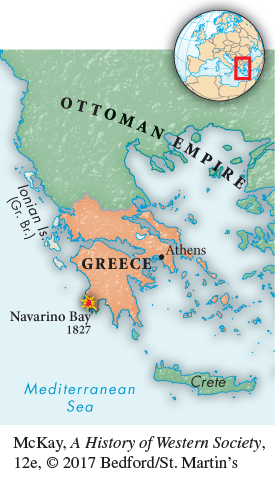National Liberation in Greece

Though conservative statesmen had maintained the autocratic status quo despite revolts in Spain and the Two Sicilies, a national revolution succeeded in Greece in the 1820s. Since the fifteenth century the Greeks had lived under the domination of the Ottoman Turks. In spite of centuries of foreign rule, the Greeks had survived as a people, united by their language and the Greek Orthodox religion. In the early nineteenth century the general growth of national aspirations inspired a desire for independence. This rising national movement led to the formation of secret societies and then to open revolt in 1821, led by Alexander Ypsilanti (ihp-
704
At first, the Great Powers, particularly Metternich, opposed the revolution and refused to back Ypsilanti, primarily because they sought a stable Ottoman Empire as a bulwark against Russian interests in southeast Europe. Yet the Greek cause had powerful defenders. Educated Europeans and Americans cherished the culture of classical Greece; Russians admired the piety of their Orthodox brethren. Writers and artists, moved by the Romantic impulse, responded enthusiastically to the Greek national struggle. The famous English Romantic poet Lord Byron even joined the Greek revolutionaries to fight (as he wrote in a famous poem) “that Greece might yet be free.”
The Greeks, though often quarreling among themselves, battled the Ottomans while hoping for the support of European governments. In 1827 Britain, France, and Russia yielded to popular demands at home and directed Ottoman leaders to accept an armistice. When they refused, the navies of these three powers trapped the Ottoman fleet at Navarino. Russia then declared another of its periodic wars of expansion against the Ottomans. This led to the establishment of a Russian protectorate over much of present-